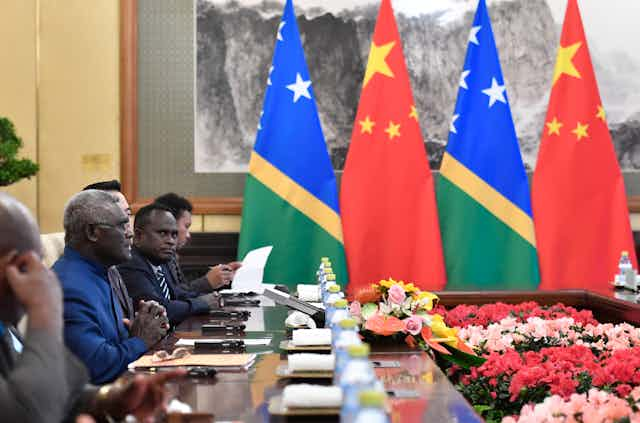The news China has negotiated and signed a defence cooperation agreement with the Solomon Island has exposed the Australian government to a barrage of criticism.
Perhaps seeing an opportunity to score points in this increasingly khaki election, Labor responded this week with a Pacific policy announcement it says would provide a “whole of government effort […] to reassure the region they can rely on Australia.”
So what has Labor promised, and to what extent is this issue really an election game-changer?
Read more: In the wake of the China-Solomon Islands pact, Australia needs to rethink its Pacific relationships
What has Labor announced?
The key elements of Labor’s plan include:
a new Australia-Pacific defence school to train security forces from Pacific Island nations, leading to what it describes as “deeper institutional links between the ADF and its regional counterparts”
increased funding for the Pacific Maritime Security Program, providing aerial surveillance of Pacific Island countries’ exclusive economic zones, which Labor says will help Pacific governments counter illegal fishing
an Indo-Pacific broadcasting strategy that “boosts Australian public and commercial media content to audiences in our region”.
Also on the cards are aid increases, support for climate infrastructure, and improvements to Pacific labour arrangements to help address economic challenges in the Pacific and ease Australia’s agricultural worker shortages.
Prime Minister Scott Morrison quickly dismissed the plan as “farcical” on Tuesday.
A stoush over the Pacific
Labor’s announcement takes the fight to the government in an area where it has traditionally been strong.
The Coalition’s advantage is best evidenced in the khaki election of 2001. Howard drew a rabbit out of a hat by cracking down on “unauthorised arrivals” and launching the “war on terror” in response to the September 11 terrorist attacks on the US.
Since then, Labor has been consistently wrong-footed by the Coalition on national security.
Labor’s announcement seems to narrow the gap, but in reality only has a light khaki tinge.
The defence school proposal involves a worthwhile focus on military diplomacy with Pacific security forces. But this only involves modest spending of A$6.5 million over four years “through existing Defence resources”.
The expansion of maritime surveillance meets a demand to counter increasingly sophisticated illegal fishing and smuggling. But it’s also a very modest increase at just $12 million and, as Labor says in its own press release, “the cost of this measure will be met from existing defence resources.”
Spending so little from the $48 billion defence budget is underwhelming and hardly a creative response to China’s increasing influence in the Pacific.
Aid spending may well appeal to inner city voters, most of whom already vote Labor (or Green). Farmers will be pleased with any streamlining of visas for foreign workers, but it seems to me an issue unlikely to shift allegiances.
Increased surveillance of illegal fishing and other initiatives will be welcomed by Pacific island governments, but they can’t cast a vote for Labor.
Labor’s announcement simply signals it senses political mileage can be gained from the Coalition’s vulnerability on the Chinese security agreement issue.
It wants to deny the Coalition any opportunity to paint it as soft on national security. But it’s not offering any hugely substantive alternative.

A cacophony of dire predictions
What’s more troubling is the politicisation and militarisation of foreign policy. This removes any substantive alternative that Labor could offer on Pacific policy.
Among the cacophony of dire predictions of the China threat there is very little circumspect commentary on the options Australia faces.
Nor is there much analysis of Australia’s own role in militarising Chinese foreign policy in the Pacific.
The Morrison government’s finger waving about “red lines” over the feared Chinese base on the Solomons fits a tried and tested “megaphone diplomacy” approach.
This approach will not be welcomed by Pacific islands resentful of Australia’s unwillingness to meaningfully address the existential threat climate changes poses to their very survival.
What Pacific islands really want is for Australia to make deep, rapid and substantive cuts to our emissions.
If Labor is seeking to outdo the Coalition’s attempts to inflate national security threats, it has a long way to go.
Signalling a willingness to fight a khaki election may prove counterproductive as it could prompt a more bellicose response from the government – one Labor may be unwilling to match.
For example, Defence Minister Peter Dutton this week warned Australians to “prepare for war”. It’s hard for Labor to coherently respond to such statements without being seen as either mirroring the Coalition or appeasing China.
Moving debate further toward dire Cold War style worst-case scenarios helps nobody.
It is no substitute for dispassionate analysis that protects Australia’s interests, respects Pacific interests and accepts the reality of China’s influence in the region.

